

Staff of Osaka City Economic Bureau
Sponsored by the Osaka-Chayamachi Rotary Club
Introduction
I recently visited R.I.D-1050 in England as a member of the GSE team under
the sponsorship of the Osaka-Chayamachi R.C. I experienced many things in England
that will certainly be valuable to me not only in my work, but in my personal
life and in the way I think about things. I am thankful to everyone who played
a part in supporting me in this program.
D-1050
R.I.D-1050 consists of the southern part of Great Manchester, and Cheshire
County to the south and the northern part of Stock-on-Trent. The city of Manchester
is one part of Great Manchester (Greater Manchester is made up of Manchester
and 9 boroughs. In general, most Japanese have a vague notion that the region
called Manchester is made up of all of Greater Manchester
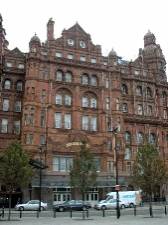 .
.
When we hear of Manchester the first thing we usually think of is the fact
that Manchester was the origin or heartland of the Industrial Revolution. Until
I visited there, I had envisioned Manchester as bristling with textile plants
and other factories, but today, textile plants make up less than 1% of the industry
in Manchester. These days, Manchester serves as a major center of the service
industry, and downtown Manchester has been transformed into a commercial center
with its streets lined with modern buildings. Still, there are some building
still preserved that are several hundred years old, such as churches and homes,
and the combination of very old and very new makes Manchester a city with a
varied atmosphere. This photo shows an old, 19th century railway station, which
has been renovated and converted into an international trade fair center.
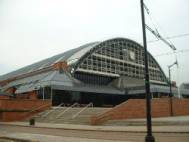
Today, Manchester is England's second largest city, and it is bustling with
activity day and night. However, just ten minutes outside Manchester by car
one can find rolling meadows and pasturelands covered with sheep and cows and
many farms. Looking at all the sheep and cows, it was hard for me to imagine
that just about one year ago, 90% of the livestock had been destroyed due to
an outbreak of hoof and mouth disease.
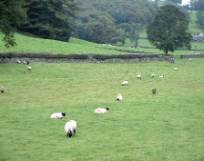
Cheshire County is filled with dairy farms and is famous for its cheeses. There
were over 100 kinds of cheese on sale at the supermarket, and in England many
people have cheese at the end of their meal instead of dessert. Cheshire cheese
has won first prize a number of times in the English Cheese Fair.
However, just as in Japan, the agriculture industry in England is on the decline,
and one of the social problems the British are dealing with is how to preserve
this industry. Also, the traditional industry in Stock-on-Trent, ceramics and
china (world-famous brands like Royal Dalton and Wedgewood) is also suffering
from poor sales and low demand.
My Homestay Families and D-1050 Rotary Clubs
While in England, I had the privilege of staying with six different families
and could experience daily life in England. All my host families were very warm
and kind, and I am so very thankful to them.
We imagine that the British like to drink tea and eat scones, and to be sure,
one of my homestay families drank a different type of tea every two hours and
I was able to enjoy a very traditional family atmosphere. However, in recent
years, more and more people are drinking coffee instead of tea at breakfast
and teatime. Unlike Japan, where we usually make drip coffee, the British put
ground coffee beans directly into their teapots just like they do their tea.
Because we were visiting Manchester, I had thought that there would be many
fans of David Beckham's Manchster United, but to my surprise I was wrong. In
Manchester, there is another team in the premiere league besides Manchester
United, namely Manchester City. There are also other leagues, so altogether,
there are quite a few teams in the Manchester region, and everyone is eagerly
supporting their team or teams. Many of the British start supporting a team
in their childhood, and I realized that I couldn't just talk about Manchester
United while in Manchester.
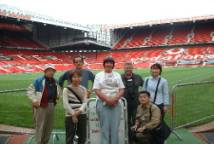
At Manchester United's Trafford Pitch
Also, we were often taken to pubs by the Rotarians we met. Pubs are places
where people drink beer and whiskey, but in recent years they have begun to
serve meals as well as drinks at more and more pubs. The pubs are usually named
after some famous person or object associated with that locale, such as the
pub "Wellington" (named for the military commander who defeated Napolean),
where I was taken. In addition to people and objects, many pubs are also named
after animals and birds, since hunting is a popular sport in the region.
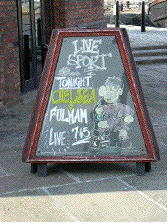
When premiere league or European Cup matches were being played, I would see
many people gathered around the TV with a mug of beer at the pubs.
In the evenings, we attended Rotary Club meetings. Our GSE team members each gave our self-introductions and then talked about the economy, history, famous things and sights in Osaka. People were very interested to see the photos of takoyaki (baked octopus balls) and the rush-hour trains packed with people.
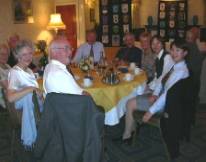
A welcome party for our GSE team
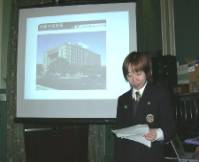
Giving my GSE presentation
British English
We Japanese are much more used to American English than British English, I realized. Here are just a few examples of the differences between the two.
| American English | British English |
| soccer | football |
| trunk (of a car) | boot |
| pants | trousers |
| gasoline | petrol |
The British are proud of their English language, and they believe that their English is true English. When I used American English, I was often corrected, "That English is wrong." Even now, it seemed to me, people in England still have pride in their deep down inside for the Great British Empire.
British Homes
In D-1050, where we visited, I noticed that land prices tended to be higher
in the suburbs compared to downtown Manchester (this is the opposite of what
we experience in Japan). This stems from the fact that during the Industrial
Revolution, the air pollution was so bad in the city that the wealthy people
moved out into the suburbs because of the fresh air. Even today, there are some
places in the city that are 100 times less expensive than land in the suburbs,
and this is one reason that slums in the cities have become a social problem.
One approach to improving the situation is that local groups are buying up residences
in the city, renovating them, turning them into public housing, and offering
them for sale as quality housing. In this way, they are attempting to revitalize
the inner city.

Also, another difference between England and Japan is that the British prefer
to have old homes. They love old, brick homes that were built in the 19th and
20th centuries because they can feel the history and warmth of these dwellings.
They buy them and carefully renovate the exterior and interior.
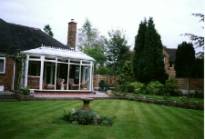
Recently, sunrooms (see photo) have become extremely popular, and I noticed
quite a few advertisements in the newspaper for sunrooms. Because this region
is quite cold in the winter, people enjoy sitting in their sunrooms and soaking
up the sun while looking at their gardens or eating their meals.
British Industry
I am presently working for the Osaka City Economic Bureau. In Osaka, small
and medium-size businesses have been suffering through a prolonged business
slump. While in England, I was able to study the strategies actively being employed
there to help promote industrial growth.
Benefits of doing business in Manchester
Manchester is the second largest city in England, behind London, and it offers
the following benefits to those who do business there.
・ an abundant labor force (There are over 7 million people living within a 30
mile radius of downtown Manchester, and 65% of them are less than 45 years old.)
・ an excellent transportation network
・ the Manchester International Airport
The airport has two runways and serves not only the major cities of Europe,
but also all major cities of America and many other countries. More than 40
million people pass through the airport annually. Also, the airport is linked
to all the major cities in England by an extensive highway system, so it is
easily accessed.
・four top level universities that are working in collaboration with industry
to contribute to economic growth
・low wages and land prices compared to London
Manchester is aggressively making efforts to attract businesses (both domestic
and from overseas) to the region by emphasizing these benefits, and it is, for
the most part, utilizing autonomous bodies to do so.
Midas
One such autonomous body is Midas, an extra-governmental organization affiliated
with the Manchester Chamber of Commerce. Midas is very actively working to attract
businesses from within England and without to set up business in Manchester.
Also, it is offering varied support to successful businesses operating in Manchester
so that they can expand their business activities domestically and internationally.
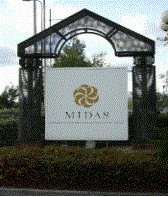
Strategies for Attracting New Businesses
In addition to Midas, I was able to visit the Manchester City Hall and Chamber
of Commerce while I was in England. They were working together with Midas in
the southern part of Greater Manchester to attract businesses to Manchester.
Also, in other areas, they are actively working with not just autonomous bodies,
but also with private companies (on a consignment basis) to invite companies
to Manchester.
In England, the most common way of attracting businesses is for autonomous
bodies and private companies to purchase empty plots of land or unused properties
and then offer them at bargain prices to businesses considering setting up shop
in the area. In Osaka, the main approach is offering subsidies to companies.
In England, they usually erect buildings on a property and rent it, or sell
the land or buildings to companies. They also purchase empty schools, flour
mills, and other old buildings and, after renovating them, rent them to businesses.
This approach resembles what was done with the old waterworks building in Osaka.
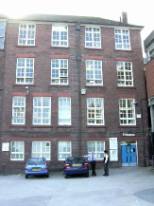
Because various autonomous bodies are working hard to attract new business to
their areas, the competition between these organizations can become quite intense.
They are prepared to quickly offer a variety of perks to prospective businesses,
and those perks involve both physical properties and non-material benefits and
incentives. For example, in the Manchester region, many companies that are considering
the establishment of new stores or factories are interested in moving in as
quickly as possible and starting business, so to accommodate these desires,
they have prepared a wide variety of offices to make it easier. For example,
they offer everything from office space with absolutely nothing but empty rooms,
to offices completely furnished with desks and chairs, personal computers and
OA equipment, etc. The size of the offices varies from single-person offices
to those able to accommodate from 5 to 60 employees, depending on the desires
of the prospective companies.
Also, in England (as in Japan), they value the proverb "A rolling stone
gathers no moss." In other words, changing one's office location several
times gives the impression of instability. So, in the same building, they will
provide offices of varying sizes so that a company that starts out small and
succeeds can move up in office size within the same building complex. This means
their address and phone number(s) will not change, even though they move their
office. This makes it easier for them to attract new companies.
Moreover, they are not only providing office space. At the same time, they
also construct buildings that can serve as warehouses and factory buildings.
For example, buildings that could accommodate a large-scale supermarket that
wants to rent a lot of land for a distribution center, or a pharmaceutical manufacturer
who is looking for a place for a pharmaceutical plant. In this way, they are
making use of innovative and advantageous approaches to help attract businesses.
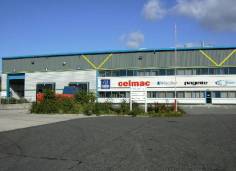
One of the greatest requirements of new businesses is being located within
one mile of a highway interchange. Since cars are the most common means of transportation
in England, this is a vital requirement, not only from the standpoint of product
distribution, etc. but also because most of their employees will come to work
by car. For this reason, some autonomous bodies apply for financial assistance
from the European Fund and use it to pay for the construction of an interchange
near their building sites.
Naturally, the organizations also offer a variety of free support services
related to operating a business. For example, consulting services, business
matching services for companies seeking to expand operations.
In some cases for very large businesses, they will offer cheap rent or land
leasing in exchange for a promise from the company that they will employee a
given percentage of the area's labor force. The aim is to help provide employment
opportunities for the region's people since they are using the people's taxes
to help attract new businesses.
Making it quick and easy for new business ventures
Most of the negotiations associated with new business start-ups take place over
the Internet. The autonomous bodies place information related to rental or purchase
of land and buildings on their homepage or in magazines, making it easy for
prospective businesses to gather the information they need. It is also possible
for such companies to apply for the rental or purchase of facilities and land
over the Internet.

The autonomous bodies offer a number of potential sites based on the information
provided by prospective companies, and the companies choose the site they prefer
from among those. By utilizing the Internet in this way, companies that are
far away are able to contract for land or buildings without having to send someone
to the region to search for prospective sites. In some cases, it is even possible
for a company to select a place and close the contract in the same day.
This way of thinking about attracting new businesses has arisen from the idea that these public officials and private enterprises are both service-providing organizations. While in England, I realized that I want to bring this spirit, this way of thinking and acting like a service industry back to Japan.
In Conclusion
While I was in England, I was able to meet very many people. Even though we speak different languages, the most important thing is the heart. I realized that even if our words are not understood adequately, it is possible for us to communicate with heart language. This was a trip during which I was able to feel the warmth of those I met.
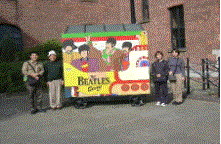
In front of the Liverpool Beatles Memorial
Also, I think we Japanese can learn quite a lot from the British spirit of learning
lessons from the past and valuing the old while actively adopting new things.
Lastly, I would like to take this opportunity to express my gratitude to everyone in D-2660 and D-1050 who helped in the GSE program, all those who cooperated in my vocational study at Manchester City Hall and the Chamber of Commerce. I would also like to thank everyone at the Osaka City Economic Bureau who allowed me to take 5 weeks off from work, and my GSE team leader and team members, who helped me from start to finish (I wonder if I could have had such an enjoyable time if I had had different team members!).
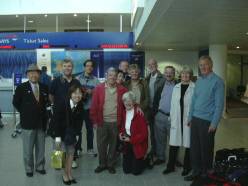
With the Rotarians who saw me off at the Manchester International Airport